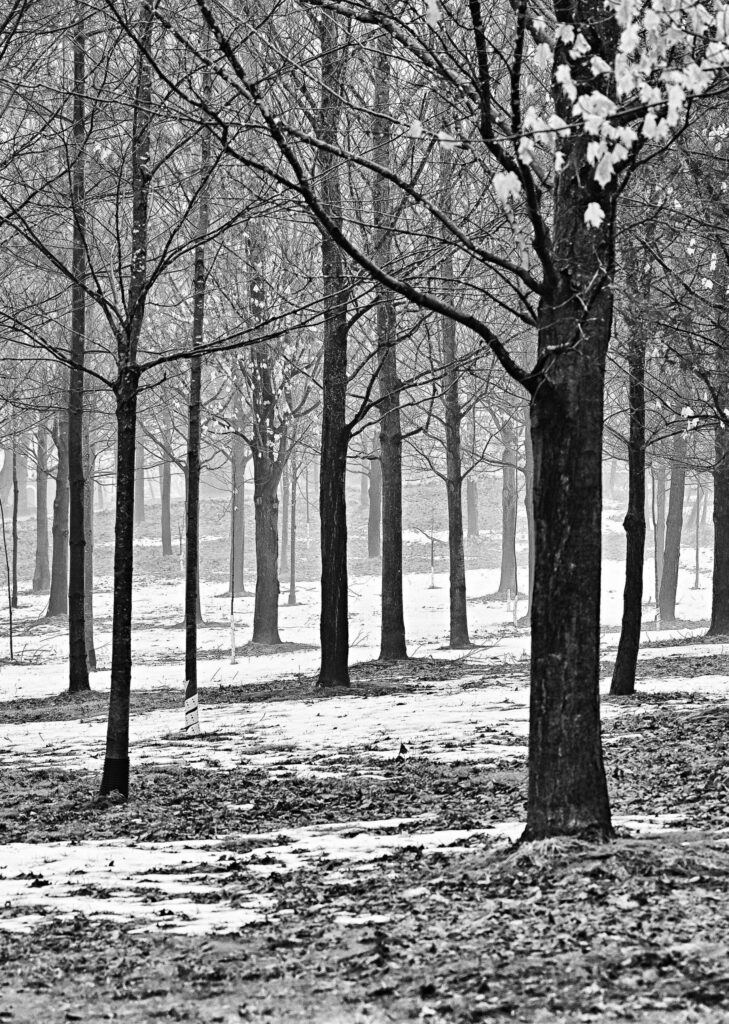Elizabeth Hay’s Snow Road Station opens fifteen years ago with Lulu Blake, a sixty-two-year-old actor, leaving an unnamed theatre (though clearly it’s the National Arts Centre in Ottawa) and brooding on her performance as Winnie in Samuel Beckett’s Happy Days. “She had muffed her lines,” we’re told. The irony is not lost on Lulu that the specific line she couldn’t remember —“O woe is me”— is a sentiment with which her character struggles. The situation of Winnie, brave and determinedly optimistic, buried first up to her waist and then up to her chin in a mound of sand, is a subtle but recurring theme in the novel. How does a woman of a certain age give meaning to her life? Can the narrowing of prospects also create opportunities for new insights, deeper vision? Has she only muffed the line or has she lost it?
We have met Lulu before: she was a secondary but significant figure in Hay’s novel His Whole Life. Like Elizabeth Strout with Olive Kitteridge and Lucy Barton, Hay has created a fictional world to which she returns, to great effect. Both His Whole Life and Snow Road Station stand on their own, but there’s real pleasure in reading them consecutively and re-encountering the characters at later stages of their lives — and in different lights.
Having flubbed her performance, Lulu flees Ottawa in disgrace and drives to Snow Road Station (a real place, a tiny Ontario hamlet about 110 kilometres southwest of the capital) to attend the wedding of the eldest son of her old friend Nan. She fails to let the theatre know of her whereabouts — a further disgrace — and she misses a hastily called last-minute rehearsal.
Lulu soon realizes that this is “a wedding of people who disliked each other and from now on would have to see more of each other.” Indeed, family drama abounds. The groom, Blake, is marrying the daughter of Nan’s childhood nemesis, a girl who unaccountably dropped her as a friend. Worse, Blake thinks he’s making a mistake. Even worse than that, he can’t back out because his bride is pregnant, and her evangelical mother doesn’t know. Also in the wedding party is Jim, Blake’s charming half-brother (and the focus of His Whole Life), who is trying to recover from a failed romance and seeking solace in Madame Bovary.

She had dramatic plans for the sugar bush.
Tom Zsolt
Lulu’s formerly strained relationship with her own brother Guy — who inherited their family’s nearby sugar bush, where she had hoped to establish a small summer drama school — is on the mend, but it’s still fragile. Nan’s ex-husband, John Sharpe, makes an appearance, bearing a striking resemblance to Samuel Beckett. Lulu’s ex-lover from her hippie days, Tony Lloyd, once the kind of young heartthrob who wore “jeans without underwear” but now a bloated gold smuggler, keeps popping up. Happily, so does Hugh Shapiro, the local piano tuner and handyman who has caught Lulu’s fancy.
Things take a dark turn when Lulu accepts a drive home from John, who assaults and humiliates her. Then she must further abase herself by asking the director of Happy Days to give her another chance back in Ottawa. But no: “A decision has been taken.” So Lulu has to leave one act of her life behind and find a way to live differently, better. “Sweet are the uses of adversity,” she says to herself, one of the many effortless literary and cultural references in the novel.
And what kind of a novel is Snow Road Station? Its precursor, His Whole Life, is in effect a retrospective state-of-the-nation tale. Published in 2015, it takes place in 1995, the year of the second Quebec referendum on independence. It is tightly structured, the parallels between domestic and national marriage clearly drawn. Its protagonists stake their claims to being on Team Yes or Team No. The late René Lévesque hovers, ghostlike, still the sentimental favourite. Snow Road Station is a little looser in conception. It is written in three acts of diminishing length —”Snow,” “Road,” and “Station”— and many of its informing themes follow a kind of dialectical logic. Recalling the history of the name of the village, Lulu thinks, “Snow Road Station was an arrival, a departure, a long wait — a place of rest, a stoppage, yet a road.” At one point, she listens to Hugh tuning Nan’s piano: “Now he was on the highest keys. Now the lowest. Now the middle.” In doing so, she sees her life as “a scene playing out — the past spooling behind her and the future spooling ahead — direction and crisis and resolution.”
In spite of its play-like structure, Snow Road Station owes much to the novel of manners. It opens with a marriage and the promise of social cohesion. Things quickly begin to fall apart: the nuptials are threatened, Lulu loses her place in the world. It closes with the establishment of new romantic relationships and the birth of a much-loved child — a child who, in many ways, restores Lulu to herself.
Unlike the novel of manners, however, which usually focuses on the young, this is a story about a woman and her oldest, dearest friend, both of them in their early sixties. What does their final act have in store for them? What new meaning can they find in their lives? “Now,” Lulu thinks, “her role was something else entirely. It was paying attention to all the life around her that wasn’t paying the least regard to her.”
Much of the book, especially its final section, is a paean to the rhythms of the natural world in a very particular, well-loved place: the annual rhythms of snow and winter, followed by spring and the maple syrup season; the decades-long rhythms of old hemlocks falling victim to looper worms and being replaced by maple saplings, which in turn become sap-bearing trees. In the getting of wisdom, these are the cycles in which Lulu must locate herself. In her darkest moment, she recalls the words Winnie speaks near the beginning of act 2 of Happy Days: “To have been always what I am — and so changed from what I was.” A similar sentiment closes the novel: “Around them the trees absorbed the rain, the lake rose, the sky emptied. The leaves became more yellow, the yellows more orange. Always what they are — and so changed from what they were.”
But just as maple syrup contains an element of sharpness behind its sweetness, so does Snow Road Station, with the looming financial collapse of 2008. The event is alluded to only briefly, but it is nonetheless a threatening cloud that hangs over the little hamlet. How will the global crisis affect this place and these characters? The future may be one of sharp changes.
Jo-Ann Wallace was a professor emeritus at the University of Alberta. Her memoir collection, A Life in Pieces, is due out fall 2024.

